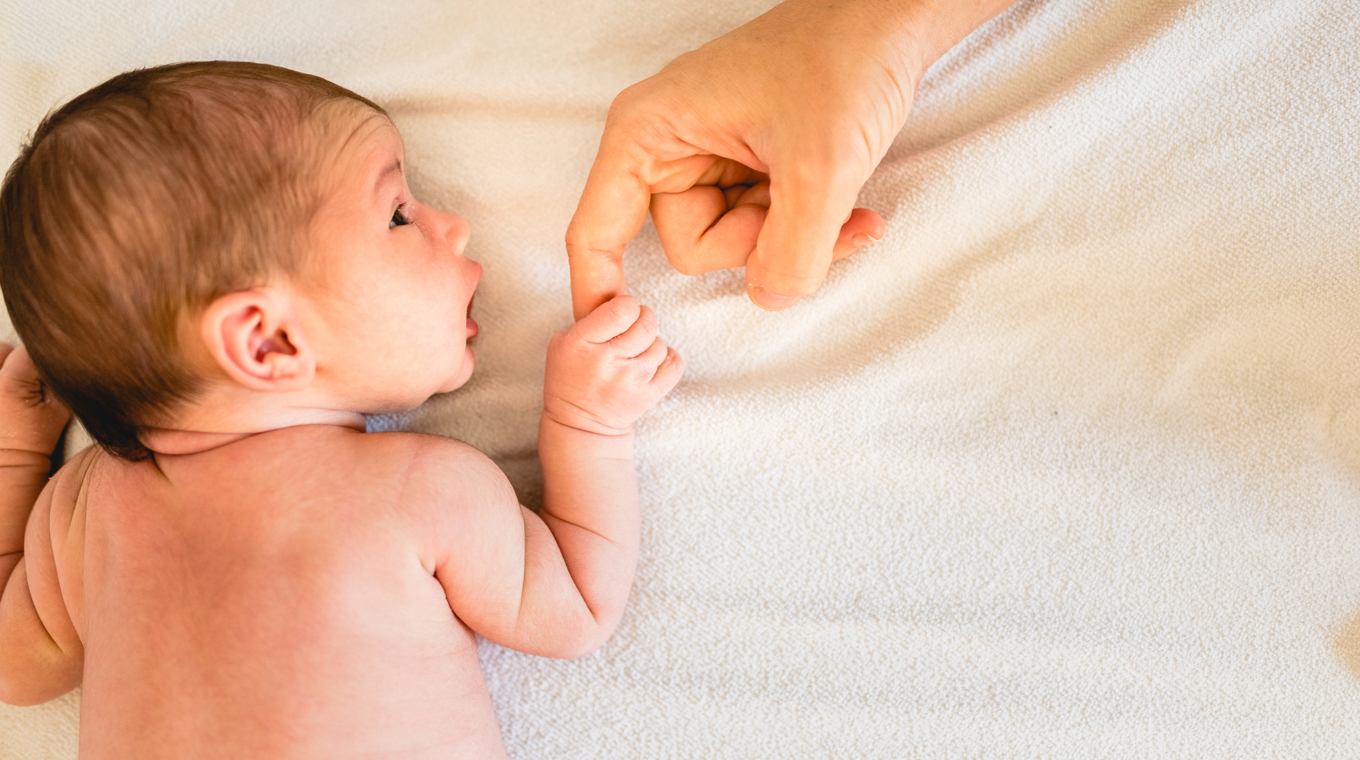
In this article
The fourth trimester is the first 12 weeks of your baby’s life outside the womb. It’s a time when both you and your baby need to adjust to the new world while bonding and enjoying each other. This trimester is also a time of many milestones for baby as they develop and grow. Knowing what to expect helps a new mom know whether or not everything is on track with your newborn. If it isn’t, you’ll want to talk to your pediatrician about options.
Development milestones for your baby

The first three months are imperative for the development of motor skills and muscle development. Dr. Martha Rivera of Adventist Health White Memorial told Mom.com that your baby’s “development is cephalocaudal, meaning from head to toe.” This means that as your baby’s brain is developing, their body is developing as well.
Sight
Babies start by seeing black and white with vision developing at first in utero and continuing throughout the first year of life. Your newborn’s vision is likely 20/200, if not 20/400 and they are extremely sensitive to bright light. Look for your baby to start tracking faces and recognize parental faces within the first eight weeks.
Communication
When it comes to speech, your baby will start to coo and then make babbling sounds. Generally, anywhere from six to twelve weeks is when your baby will have developed their own “language.” Moms are encouraged to coo or sing back to their baby and engage in this “conversation.” During this time as well, your baby will begin to bring their hand to their mouth exploring and learning to smile.
Motor skills
Your baby will have many reflex motor skills when born that include grasping and sucking. Over the course of the fourth trimester, these reflexes will become more controlled. Your baby will begin to control moving hands and arms and will learn to move their legs in a way as to develop the ability to eventually roll themselves over.
Tummy time
Positioning your infant on their stomach is one of the most important things to start immediately. “Tummy time is very important and should begin from birth onwards. Because of safety against SIDS ( sudden infant death syndrome), the AAP and WHO recommend tummy time,” Dr. Rivera told us. Besides fighting against SIDS, tummy time helps prevent head flattening (positional plagiocephaly) that commonly happens with babies that only lay on their back. It also helps your baby’s motor development, forcing your baby to move their head, legs, and eventually arms.
But it can be hard to take a baby and place them on their belly, where they seem visibly frustrated and can become fussy. Mom Vicky Smith gives us her experience. “I think it’s quite alarming at first how much babies can get upset about tummy time,” she told Mom.com. “One way to make this early stage easier is for you to lay down on the floor or sofa and put them on their tummy on your tummy so you are belly to belly.” This method is highly touted by doctors because it also allows the two of you to bond.
First wellness check and working with your pediatrician

Your baby will have their first wellness checkup just days after being born. From there, you will have a one- and two-month check-up before going into the fourth month’s pediatric appointment. Your pediatrician will check your baby’s height and weight and make sure that she is on track for growth as well checking motor skills and vision.
Realize that every baby is on their own schedule and may not always meet the same milestone success that their peers experience. Don’t make a hasty judgment if your baby is not babbling as fast as your friend’s baby. Your baby’s doctor should always be someone you trust to help determine if any type of intervention is necessary.
Taking your newborn to the doctor during COVID
You may have some reservations about taking your infant to the doctor during the pandemic, but doctors feel that keeping your baby safe outweighs the risks. “In general, we think that getting those early immunizations in for babies and toddlers — especially babies 6 months and younger — has important benefits,” Dr. Claire McCarthy wrote on Harvard Health Publishing. “It helps to protect them from infections such as pneumococcus and pertussis that can be deadly, at a time when their immune system is vulnerable.”
But they do admit there are some risks. “At the same time, they could be vulnerable to complications of COVID-19 should their trip to the doctor expose them to the virus,” she continued. McCarthy advises parents to speak to their pediatricians and find out what precautions they’re taking in their facilities during COVID, and also what they advise for your specific child and any conditions they may have. Your doctor’s advice may also depend on the prevalence of the virus in your community, and whether you or your baby’s caregiver may have been exposed.
If your baby's development seems delayed

Staying on track is important and you’ll want to pay attention to milestones to ensure that your baby is meeting all metrics. Luckily you’ll be be at the pediatrician’s monthly for the fourth trimester to have your baby examined. If you feel your baby’s development is delayed, you’ll want to bring it up the next wellness checkup.
Signs that your baby is delayed might include:
- Unable to lift their head
- Not making any cooing sounds or other vocalizations
- Doesn’t focus their eyes on you or track your movement through the room
- Won’t explore mouth with hand
- Doesn’t smile upon the recognition of a loved one or caregiver
It’s best to not jump to conclusions if your baby is not doing what other babies their age are doing. Your pediatrican is the best person to determine if there is anything wrong or to be concerned with. There’s a lot going on in the fourth trimester and your baby may simply be on their own timetable.
Samantha Meltzer-Brody, chair of the psychiatric department at the University of North Carolina, cautions new parents about letting anxiety over your baby’s health and development define your parenting. “It’s one thing to worry, but it’s another thing to worry to the extent that you’re actually just not enjoying the baby at all,” she told the Washington Post.







